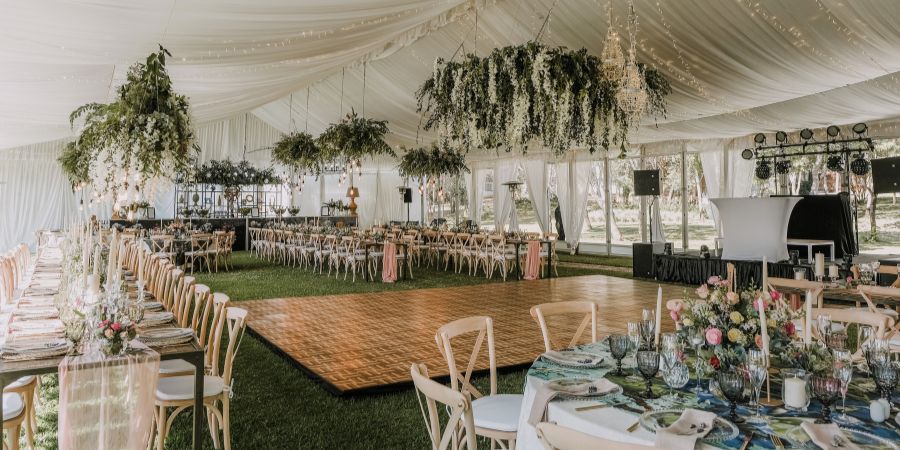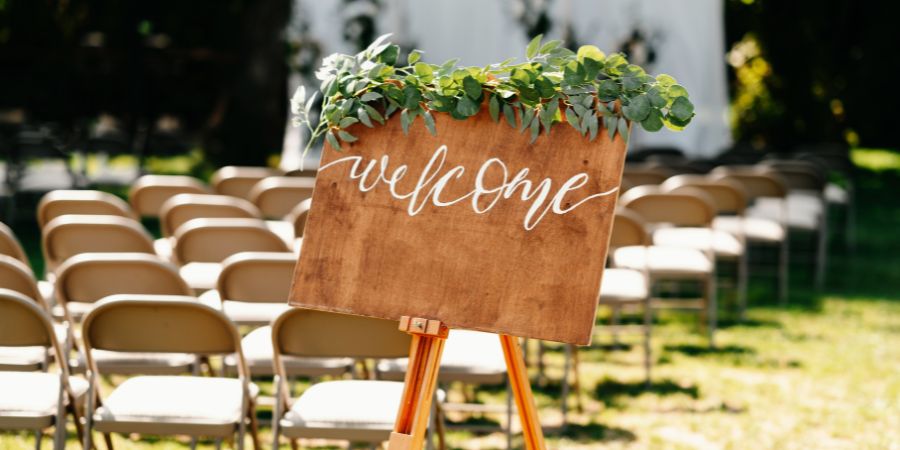
20 Essential Event Planning Tips for Beginners
Updated 2024.
Key Points
The 20 event planning tips discussed in this article are:
- Start your event planning process early
- Figure out what type of event you want to have
- Create a budget
- Create a list of To-Do tasks
- Choose a venue
- Find event vendors
- Send your invitations
- Put together event entertainment
- Book accommodations (if necessary)
- Follow up with event vendors
- Create signage
- Put some effort into marketing/promotion
- Make sure your event is properly staffed
- Have the right supplies + equipment
- Invest in event insurance
- Create a document for your event scheduling
- Document your event
- Evaluate how your event went afterwards
- Follow up with your guests
- Celebrate your success
Introduction
Trying to plan your own wedding, a party for someone you know, etc.? Then you likely know by now that planning an event can be overwhelming and stressful. After all, it requires a lot of time and patience to ensure things go smoothly.
But don’t feel overwhelmed – we’ve compiled 20 essential event planning tips for beginners that will make the whole process easier than ever!
What is Event Planning?
Event planning is the process of organizing and coordinating an event or gathering. If you’re planning your very own event, then you’re responsible for:
- Finding the location;
- Deciding on the menu;
- Arranging decorations;
- Dealing with vendors;
- Managing your budget, etc.
Though challenging, you’ll quickly come to find that event planning is a very rewarding experience!

20 Event Planning Tips for Beginners
1: Start Your Event Planning Process Early
One of the biggest mistakes people make when planning an event is not giving themselves enough time. So, start your planning process as soon as possible! This will help you avoid last-minute problems and ensure everything is ready on time.
2: Figure Out What Type of Event You Want to Have
Are you planning a wedding, a birthday party, or something else? It’s important to know what kind of event you’re having in order to make sure you stick with the right plan.
3: Create a Budget
Before you start your planning process, it’s essential to create a budget for your event. This will help you determine what you can afford (and can’t afford), as well as where to cut back if necessary.
Pro Tip: Here are the general cost factors associated with every event budget!
4: Create a List of Need-To-Do Tasks
To ensure you stay on top of everything, create a list of need-to-do tasks. This way, you can keep track of what needs to be done – and when.
Your Event Planning Checklist
If you need help figuring out what should be going on your event planning checklist, here are some helpful resources to bookmark:
- Free Download: Sample Event Planner Checklist [6 Month Timeline]
- Free Download: A Wedding Day Timeline Template
- Your Essential Conference and Corporate Event Planning Checklist
- Event Decorator Checklist
- The Ultimate Wedding Decor Checklist
- The Ultimate Party Planning Checklist Template
5: Choose a Venue
Once you have your budget set, it’s time to look for a venue that will fit your event needs. Make sure the venue is big enough to accommodate all of your guests, and that it has the proper facilities and amenities.
Pro Tip: Make sure your event venue has these 7 things!

6: Find Event Vendors
You’ll need to find and hire vendors to help make your celebration a success. This could include:
- Catering services;
- Photographers;
- Videographers;
- Florists and floral designers;
- Cake artists;
- Guest speakers;
- Event decorators;
- DJs and/or live entertainment, etc.
Furthermore, make sure to do your research and get recommendations from friends or family. This will help ensure that you’re working with reputable vendors!
7: Send Your Invitations
Once you have the details of your event all sorted out, it’s time to start sending invitations. You can do this online or with traditional paper invites. Importantly, make sure your invitations include all of the following information:
- The date and time of your event;
- Event location;
- Event host contact information (if applicable);
- List of invited guests (if a corporate event, for example);
- RSVP instructions;
- Dress code (if applicable);
- Menu (if food and drinks are being served), etc.
8: Put Together Event Entertainment
Make sure you have some form of entertainment lined up for your event. This could include anything from live music to a game show to a magician.
9: Book Accommodations (If Necessary)
If you’re hosting an out-of-town event, make sure you have accommodations booked for all of your guests, such as:
- Transportation services;
- Babysitting services;
- Airport shuttles;
- Venue directions;
- Physical accessibility for anyone with a disability;
- Parking permits, etc.
10: Follow Up With Event Vendors
Make sure you follow up with all of your vendors a few days before the event. This will help ensure that everything is running smoothly and that everyone is on the same page. In addition, double-check to make sure all payments have been made and confirm any services or deliveries.

11: Create Signage
If you’re having an outdoor event, make sure to create signs that will direct guests to the right area. This is especially helpful if your event is taking place in a large venue or park!
12: Put Some Effort Into Marketing and Promotion
Remember: The goal of event promotion should be to generate as much interest as possible for your event. You can do this by:
- Creating a website or landing page for your event;
- Using social media platforms to promote it;
- Purchasing online and print ads;
- Reaching out to local influencers, etc.
13: Make Sure Your Event is Properly Staffed
If you’re hosting a large-scale event, you’ll need to have enough staff on hand to help it run smoothly. This includes volunteers, security personnel, and anyone who is helping to set up and/or tear down the event.
14: Have the Right Supplies and Equipment
Make sure you have all of the supplies and equipment needed for your event. This could include things like tables, chairs, stage lighting, sound equipment, etc.
Pro Tip: Need to plan a wedding and thinking of hiring a professional wedding planner? Here’s EVERYTHING you need to know about this process!
15: Invest in Event Insurance
It’s always a good idea to purchase event insurance in case you run into any unforeseen circumstances or accidents. This way, both you and your guests will be protected in the event that something goes wrong!
16: Create an Actual Document for Your Event Scheduling
Whether it’s a large or small-scale event, make sure you put together a detailed timeline and schedule for the big day. In doing so, you’ll better ensure that your event runs smoothly and on time. Moreover, provide a copy of the day-of timeline to all of your vendors and staff.
17: Document Your Event
Make sure to document your event in order to capture memories and create content for future marketing material (or just your personal social media feed). You can do this by having a photographer or videographer on-site. Alternately, you can also ask guests to take pictures and video of the event and, for example, upload them to social media using a special, event-related hashtag.
18: Evaluate How Your Event Went
This tip is particularly useful if you’re putting together an event as part of your job. That said, it can still be just as important to reflect on how your event went (if it was a personal celebration) in case you ever want to plan another event in the future!
So, after your event is over, take the time to evaluate what went well, versus what could’ve been improved. This will help you identify areas for improvement for next time! We also recommend collecting feedback from guests, vendors, and staff in order to get the most accurate assessment.

19: Follow Up With Your Guests
Doing so is a great way to build relationships and create genuine connections – especially if you’re a professional event planner. Follow up by:
- Sending out thank-you emails or cards;
- Providing follow-up surveys;
- Hosting a post-event get-together, etc.
20: Take a Moment to Celebrate Your Event
At the end of it all, don’t forget to celebrate your success! After all, you just put together a great event. So, give yourself a pat on the back and enjoy the moment.
Should You Hire a Professional Event Planner?
While these tips can certainly help you plan an event, there are some situations in which it may be necessary to hire a professional. Furthermore, you may decide to hire an event planner simply because you want to take the stress off your own shoulders – and that’s okay, too!
Event planners have the experience and expertise needed to take care of all the details of your event – from start to finish. They can also provide valuable insight on how to make sure your event runs smoothly and is a success. So, if you’re feeling overwhelmed with planning your event, don’t hesitate to reach out for help!
